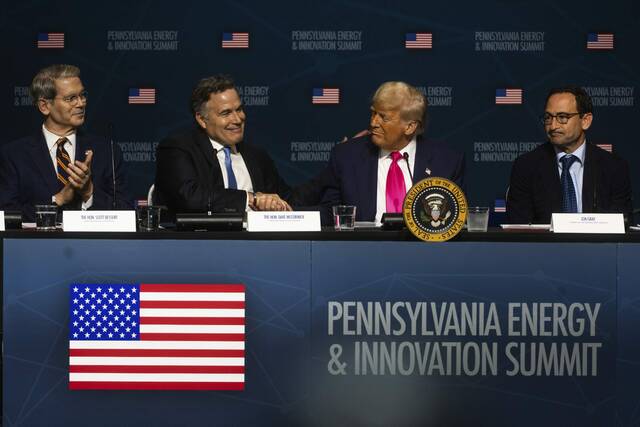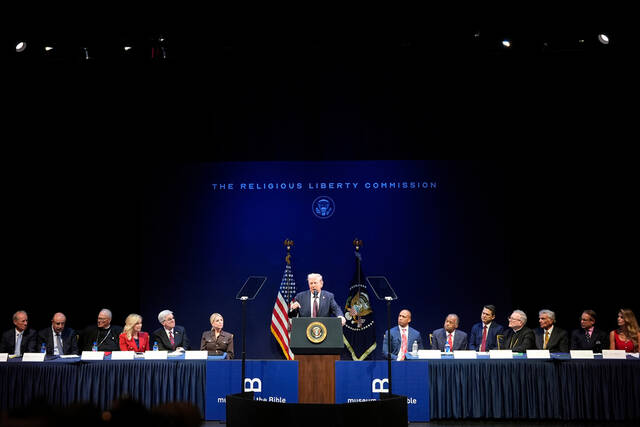Last week, Pennsylvania took a historic step forward, securing $70 billion in federal, state and private funding in an effort to become America’s powerhouse for artificial intelligence (AI) and energy. Convening at the artificial intelligence powerhouse, Carnegie Mellon University, a bipartisan group led by Sen. Dave McCormick launched Pennsylvania’s Innovation and Energy Summit.
McCormick was joined by President Trump, who delivered the keynote address, Sen. John Fetterman, Gov. Josh Shapiro and many others, all united to support McCormick and his bold vision for Pennsylvania’s technological revival, refurbishment and reimagining the opportunities for defunct steel mills to power the next generation of AI.
Beyond the disclosed AI and energy opportunities, what more can be done? A state-based sovereign investment fund for Pennsylvania.
Despite announced plans, unlike Norway, Saudi Arabia and even Australia, historically the U.S. has never had a country-level, federal sovereign wealth fund, yet in the absence of such a fund, the U.S. had an even more powerful proxy, the combined U.S. state public pensions funds, university and college endowments, and nonprofit/foundation investors. For background, U.S. pension funds derive their funding from the retirement accounts of police, firefighters, nurses and other government workers to secure their future benefits, while endowments rely on a combination of donations from wealthy alumni and student tuition. And while the Alaska Permanent Fund successfully pioneered mineral-based state sovereign fund in 1976, yet recently Ohio launched a privately capitalized fund to secure and accelerate their ecosystem by channeling investments back into local economies and infrastructure.
Pennsylvania can also leverage its own private capitalized fund from the extensive corporate and foundational might to secure and accelerate our ecosystem to ensure the state’s technological leadership endures in the decades ahead.
America’s investments: A Trojan horse
Success is not only building; it is also about recognizing the state’s own unforced errors. Even as we celebrate this moment in new leadership in AI and energy, Pennsylvania faces a critical decision. Leadership also means honesty, Pennsylvania must confront a troubling contradiction: Tens of millions from the state’s pension funds and university endowments remain invested in China, directly empowering a rival working tirelessly against America’s interests.
China has relied on Western capital to turbocharge its rise, exploiting investments to gain access to cutting-edge technologies critical to its geopolitical ambitions. The minimally regulated private equity and venture capital transactions provide China with the networks, expertise and funding it needs to dominate fields like artificial intelligence, quantum computing and biotechnology.
Since Future Union’s release of last year’s “Rubicon Report — Institutional Investors & Funds Financing China & U.S. Adversaries,” Indiana reviewed its investments and was the first of six states — Texas, Oklahoma, Florida, Missouri, Indiana and Kansas — to announce cessation of investments in Chinese private equity funds. Pennsylvania now has an opportunity to do the same. Per Future Union’s reporting, in the five years period, U.S. public pensions and university endowments poured a staggering $146.1 billion into Chinese private equity funds, with nearly half of that coming in the last three years. Many of the U.S. public pensions, college and university endowments, and nonprofits/foundations have been the enabler and source of capital of the private equity funds investing in Chinese startups, and directly adverse to the future success of democracy’s technology and encouraging such change is a core element of Future Union’s work.
With 56 of the 74 largest pensions in America having made investments in private equity funds in China, or U.S. venture investors dedicated to investing in Chinese startups, the vast majority of state pensions are assisting China under contractual limited partner agreement. These agreements, and the associated funding responsibilities, typically last for seven to 10 years, meaning that commitments made a decade ago are still being funded into Chinese startups. Those investment decisions were bad then, and worse now.
How America wins
These pension funds, entrusted with the retirements of teachers, firefighters and police officers, are fueling industries that Beijing leverages to challenge America’s technological and military edge. And it is not just our state pensions; our top Pennsylvania education institutions like Carnegie Mellon, the University of Pittsburgh and the University of Pennsylvania endowments are key contributors to financing our foe, each of whom are significantly invested in funds facilitating anti-American, Chinese innovation.
This isn’t just poor economics — it’s a national security crisis.
And while America’s pensions and university systems could continue to avoid hard, public choices, the better — and more dramatic — option exists.
Just stop.
It is time to draw a clear line: Pennsylvania’s state tax and university dollars will no longer bankroll an adversary to America.
The threat is already in plain sight. TikTok, a Chinese-owned app, has become a global phenomenon that harvests massive amounts of user data with the potential to manipulate public opinion, as U.S. intelligence agencies have repeatedly warned. Despite this, America has allowed TikTok to thrive, emblematic of a broader failure to confront Beijing’s technological dominance.
This is not just about TikTok. It is a pattern. China’s state-controlled economy ensures that profits from U.S. investments serve the Chinese Communist Party.
Fortunately, states are fighting back, recognizing that divesting from Chinese entities, collectively, demonstrates what is possible when leaders prioritize security over short-term financial returns. Yet most states remain complacent, allowing their pension funds to feed a system that is eroding America’s leadership and security. As noted, even universities, often shielded from public scrutiny, must answer for their investments.
Now, Pennsylvania stands at a crossroads. It can either rest on the laurels of last week’s summit or seize the moment by eliminating risky investments in China and redirecting those funds toward Pennsylvania’s own critical technology sectors with a fresh view of a state-led sovereign wealth fund. By divesting from Chinese entities, Pennsylvania can protect retirees’ savings from volatile and opaque markets where profits disappear overnight at Beijing’s whim — and encourage our state colleges and universities to do similarly.
History demands action
This moment demands bipartisan courage and clear-eyed fortitude. The geopolitical threats — from Ukraine and the Middle East to the South China Sea — underscore the urgent need for states to align their economic power with national interests. In the proverbial shield-and-sword strategy, Pennsylvania can lead this vital effort, demonstrating that American prosperity and security go hand in hand, using the state-sovereign private fund to accelerate growth here by investing in startups like Gecko Robotics and Lovelace AI, among others, and a shield by ceasing longstanding mistakes and preserving vital pension and endowment capital where it is most needed, specifically, deployed in our state and country.
Given Pennsylvania’s storied historical relevance, a private fund would go a long way, channeling corporate, foundation, pension and endowment resources back into local economies, driving sustainable economic renewal and securing our technological leadership for decades under names like “Revolution,” “Declaration,” or even “Franklin’s Founders Fund,” which evoke pride. And as a Pittsburgh native advising on technology-driven economic revitalization, I believe deeply in Pennsylvania’s potential.
However, real issues need to be addressed, including taking risks, “moonshots” that Pennsylvania has shirked in recent years, as well as confronting difficult truths and eliminating self-defeating errors.
Now is the moment for leadership. Pennsylvania’s economic resurrection as a leader in advanced AI, manufacturing, technology and investment is a momentous story. It signals what is possible and represents the next step in reimagining the heartland of America and reinvesting in our country while starving China of funding.
The choice is clear: Will Pennsylvania leaders join these six states in taking the lead in divesting from China, while investing in our own promising future, or will they continue funding America’s principal adversary? History will judge our state’s response at this moment, and we want to be on the right side of history. Let’s ensure Pennsylvania chooses wisely and boldly.
Andrew King is general partner at Bastille Ventures, investing in critical technology furthering national security, and the founder and president of Future Union, an organization working with financial firms and the private sector to combat state espionage and intellectual property theft.








